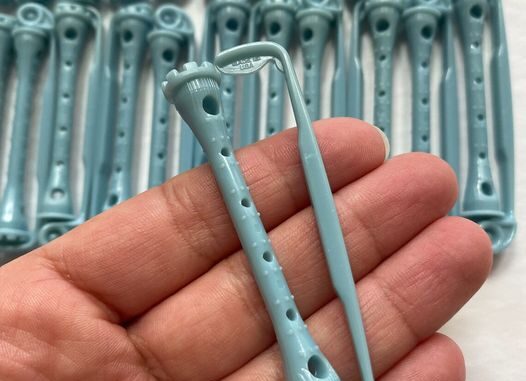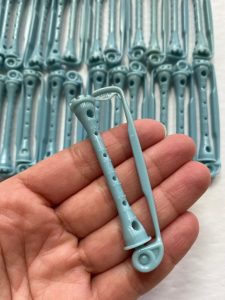
Perm rods, also known as perm rollers or curling rods, are charming little tools that were once the backbone of creating those glamorous permanent waves or curls in the hair. These vintage gems tell a fascinating story about the evolution of hairstyling, reflecting the changing beauty trends and technology from decades past.
A Brief History of Perm Rods
Perm rods first made their appearance in the early 20th century. This period saw the rise of “perms”—a hair treatment that chemically alters hair to create permanent waves or curls. Early perm rods were essential for holding hair in place during this treatment. These rods were quite simple, typically crafted from metal or plastic and designed in a straightforward cylindrical shape.
Advancements in Design

By the mid-20th century, perm rods underwent significant improvements. The 1950s and 1960s saw a surge in the popularity of perms, prompting manufacturers to innovate. They started making rods in various sizes and materials, including plastic and rubber, to create different curl styles and cater to various hair types. Flexible, plastic-coated rods made the perming process more comfortable and efficient.
Cultural Impact
The 1980s and 1990s were the golden era for perms. Everyone from celebrities to everyday folks embraced voluminous curls and waves, turning perm rods into a household staple. This era’s glamorous and high-maintenance hairstyles made perm rods culturally significant and a symbol of style.
Usage of Perm Rods
The Perming Process
Perm rods play a vital role in the perming process, which includes several steps:
Preparation: Hair is first washed and treated with a perm solution that breaks down its natural structure.
Rolling: Hair is sectioned and each section is wrapped around a perm rod—the rod size determines the curl or wave size.
Processing: The hair, coiled on the rods, is exposed to a chemical that sets the curl pattern.
Neutralizing: A neutralizer is then applied to restore the hair’s natural structure and lock in the curls.
Types of Perm Rods
Perm rods come in different sizes, each creating unique curl styles:
Small rods create tight, defined curls.
Medium rods produce loose waves or soft curls.
Large rods result in voluminous, beachy waves.
Home vs. Salon Use
While professional salons have always been the go-to for perms, the popularity of at-home perm kits took off in the 1970s and 1980s. These kits included perm rods, solutions, and detailed instructions, making the process accessible to anyone wanting to try it at home.
Legacy of Vintage Perm Rods
Cultural Significance
Vintage perm rods are more than just hairstyling tools; they reflect an era when curls and waves were all the rage. They embody a time when perms symbolized modern sophistication and beauty trends.
Influence on Modern Styling
Although perms aren’t as mainstream as they once were, the legacy of perm rods still influences hairstyling today. Modern stylists and enthusiasts sometimes use perm rods to create retro-inspired looks or as charming collectible items, blending vintage flair with contemporary styles.
Collectors’ and Enthusiasts’ Interest
For collectors and beauty aficionados, vintage perm rods hold a special appeal. They are prized additions to vintage beauty collections and often feature in retro-themed salons and beauty museums. Their historical value offers a fascinating insight into the evolution of hairstyling tools and techniques.
Nostalgia and Revival
The nostalgia around vintage perm rods has sparked a renewed interest in classic curls. Some modern hairstylists use vintage techniques and tools to achieve authentic, old-school looks, creating a delightful blend of past and present in their creative work.
Conclusion
Vintage perm rods are more than mere hairstyling tools; they mark a period of innovation and cultural significance in beauty history. Their lasting impact on beauty trends and their continuous influence on modern hairstyling underscore their enduring legacy. Whether viewed as historical artifacts or practical tools, perm rods provide a captivating glimpse into the art and science of haircare through the ages.
Leave a Reply